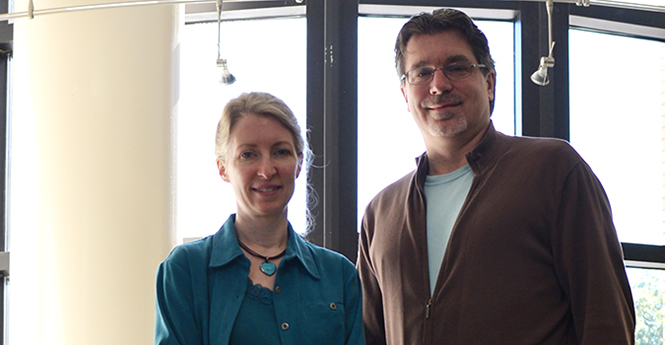KSU professors and students help define the norms of today’s knowledge
Psychology professors Katherine Rawson and John Dunlosky. The two updated a 1980 general. Photo by Leah Klafczynski .
It seems the only constant about rapidly developing technology and media is change. Despite significant growth over the past 30 years, they continue to have an impact on the way people learn, think and act.
A recent study, conducted this year with the help of two Kent State professors, reaffirmed that a college student’s general knowledge has shifted since 1980, a time that heralded Walkmans, fax machines and VCRs.
Psychology professors John Dunlosky and Katherine Rawson teamed up with three other researchers to update the General Knowledge Norms’ study that was originally completed in 1980. Using the same 299 questions that were asked during the first analysis, they surveyed a group of 671 college students from Kent State and Colorado State University with trivial pursuit style questions covering topics such as history, sports, geography and other categories. The findings varied drastically.
Dunlosky said he and his colleagues decided to renew the study as a service to the larger research community.
General Knowledge Norms’ study results
“What we wanted to do was basically just re-norm these general knowledge questions so other researchers would have an up-to-date estimate of how well college students can pass these various types of questions,” he said.
Although a shift in knowledge was expected, Dunlosky said he and his fellow researchers were surprised by the some of the results.
“It’s not necessarily any one of the questions got us, but it was more the fact that so many of them that at least a good handful of students knew 30 years ago that no one even knew about this time around,” he said.
Although general knowledge norms are shifting, Dunlosky said that this study does not reflect how well students will do in college.
“The kinds of questions that we were using are definitely trivial pursuit style of questions that were used in the 1980 norms,” he said. “We all know that trivial pursuit is fun, but typically that information isn’t foundational. Not knowing it is not going to undermine your success at Kent State or any place else for that matter.”
Traci Williams, associate lecturer in the School of Journalism and Mass Communication, believes that the large shift in knowledge has a lot to do with the impact media and technology has on society.
“I think it definitely influences this generation more than my generation because you guys have all this technology,” Williams said. “The media is so powerful. It’s amazing to me the impact the wrong and right statements can make.”
An example Dunlosky provided related to the 9/11 attacks and the anniversary that receives media coverage and remembrance every year.
“One question the students did much better on today than they did 30 years ago is of which country is Baghdad the capital,” he said. “In 1980, only seven percent of the students knew it was Iraq, whereas now the percentage is much higher for that particular question because of the Iraq War.”
Amber Fennell, junior early childhood education major, agrees that the media and technology have a large impact in her life — “I don’t know what I’d do without my phone,” she said. “I use it for everything.”
Fennell said people need to be more vigilant when it comes to researching facts. They can utilize the advances in technology instead of letting technology utilize them.
“The Internet is tool for us,” Fennell said. “That doesn’t mean that we should let it do all the work for us. We need to play an active role in what we’re being told and not just take everything at face value.”
Williams said that communication has also changed drastically as a result of the advances in technology.
“This generation doesn’t talk face-to-face anymore,” she said. “I have seen friends sitting next to each other and instead of talking to each other, texting each other.”
Matthew Gazella, junior aeronautics major, admitted to frequently utilizing the convenience of texting.
“I would much rather text than talk on the phone,” Gazella said. “Texting makes it easier to multitask and you can say things that wouldn’t normally feel comfortable saying out loud.”
Dunlosky said he wasn’t expecting the study to get so much attention but believes that it is positive for the university.
“I’m just a scientist. I just do my thing and then kind of fly under the radar,” he said. “We work really hard over here doing our work and most of it never gets any attention. The fact that this is going out nationally is good for Kent State.”
Contact Kelsey Leyva at [email protected].



